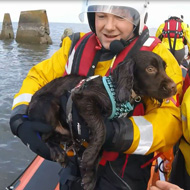
RNLI reports 58 incidents so far this year
The Royal National Lifeboat Institution (RNLI) is urging dog owners to take care around coastlines, as it reveals it has responded to 58 incidents so far this year.
In 2015 the RNLI launched 77 times to incidents involving dogs, many of which saw owners getting into difficulty too. Provisional figures for 2016 show no let up as there had been 58 incidents as of August.
On August 1, a small terrier became stranded on a mud bank with a fast incoming tide. A pair of walkers fortunately spotted the dog and the coastguard was called to the scene. When the lifeboat arrived, a RNLI volunteer waded through the mud to collect the exhausted and frightened little dog.
Another incident in April this year resulted in a dog owner calling 999 when their dog fell from the cliffs into the sea off Weston Super Mare. Volunteers found the dog on a rocky outcrop that was inaccessible by land so crews carefully manoeuvred the lifeboat around sharp rocks and took the dog back to shore with just a few scratches.
Guy Addington, community incident reduction manager, says unfortunately not all call outs end so happily. But by following a few simple steps, owners can keep themselves and their animals from further danger.
RNLI advises dog owners to keep their pet on a lead at all times when walking close to a cliff edge.
Owners must not to try to rescue their dogs if they fall, swim out too far or get stuck in the mud. Instead, move to a place they can get to safely and call them - most will be able come back by themselves.
If you are worried about an animal, call 999 and ask for the coastguard.
Mr Addington said: "We will often launch to the assistance of animals as sometimes a tragic experience has shown that dog owners will take a huge risk to rescue their pets or livestock, in particular dogs."
Image © RNLI



 The Veterinary Medicines Directorate (VMD) is inviting applications from veterinary students to attend a one-week extramural studies (EMS) placement in July 2026.
The Veterinary Medicines Directorate (VMD) is inviting applications from veterinary students to attend a one-week extramural studies (EMS) placement in July 2026.